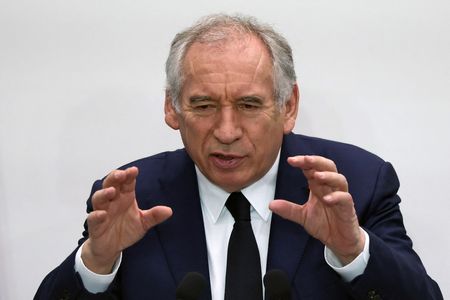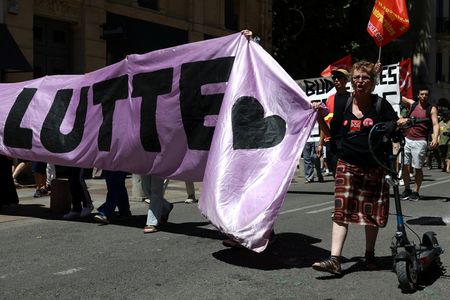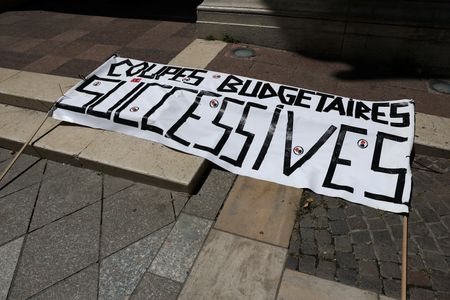By Gabriel Stargardter and Elizabeth Pineau
PARIS (Reuters) -French Prime Minister Francois Bayrou wants to scrap two public holidays to put France’s finances back on track. It’s a brave move: The last French leader to try something similar soon found himself out of a job.
Bayrou, a long-time debt hawk who is fighting for his political survival, made the headline-grabbing proposal on Tuesday, when he outlined a series of deficit-reduction measures worth 43.8 billion euros ($50.88 billion) next year aimed at lowering France’s debt.
“The entire nation must work more – to produce, to increase overall national activity throughout the year, and to improve France’s situation,” Bayrou said. “That’s why I propose the removal of two public holidays.”
His idea is not without precedent.
In 2003, just months after a heatwave that killed nearly 15,000 people, then-Prime Minister Jean-Pierre Raffarin announced a plan to scrap the Pentecost Monday holiday and replace it with a “day of solidarity.” Pitched as a form of civic duty to finance aid for the elderly who had been disproportionably affected by the heatwave, employees would work for free while employers would also contribute.
The measure, rolled out in 2005, was a disaster. Some offices and schools shut; others remained open. Some workers got paid; others didn’t. Strikes and protests soon followed.
“It has become a social and political mess,” newspaper Le Monde wrote in an editorial at the time.
Two weeks later, the day after voters rejected a referendum on the European Union constitution, Raffarin resigned.
BAYROU’S UNCERTAIN FUTURE
Bayrou, who has survived eight attempts to topple him since taking office last December, is certain to face more no-confidence votes in a few months when budget talks gather momentum. His fate now rests largely in the hands of the far-right National Rally (RN), France’s largest parliamentary party, which can topple him if its lawmakers team up with the left.
“If Francois Bayrou does not change his plans, we’ll vote for a motion of no-confidence against him,” RN party chief Marine Le Pen said on Tuesday, joining leftist party chiefs who also signalled their willingness to unseat Bayrou.
Jean-Daniel Levy, from pollster Harris Interactive, told Reuters that while most supported Bayrou’s deficit-reduction efforts, 70% of respondents to their snap poll rejected the scrapping of two public holidays, and 61% rejected Bayrou’s proposed welfare spending freeze.
“I think everyone agrees we need to make an effort — but there are efforts, and then there are efforts,” said Jean Claude Vie, 85, as he walked the streets of Paris. “Is he making any effort himself?” he asked of Bayrou, saying the 74-year-old would “be better off retiring than holding onto a job that could go to someone younger.”
Ditching the Pentecost holiday was an easier sell in 2003, Levy said, as many French wanted to give back after the killer heatwave. Bayrou, however, has no such levers to pull.
“It’s perceived as a double punishment,” Levy said. “Working more without earning more, and losing moments of rest.”
Speaking on TF1 about the public holidays, Labour Minister Astrid Panosyan-Bouvet said that in “exchange” for the additional working days, a “contribution” would be requested from businesses, without giving more details.
OPPOSITION SENSES AN OPPORTUNITY
Jordan Bardella, Le Pen’s young protege and the RN’s possible candidate in the 2027 presidential vote, zeroed in on Bayrou’s proposal to abolish holidays, calling it “a direct attack on our history, our roots, and the France of workers.”
Leaders on the left were equally displeased.
Sophie Binet, who leads the CGT union, criticised the plan to scrap the May 8 holiday, which commemorates the end of World War Two, questioning the nixing of a day celebrating “the victory over Nazism, just as the far right stands at the gates of power.”
Not all were outraged.
In an op-ed in Le Monde, economist Charles Wyplosz said Bayrou’s “budget proposal is courageous and, overall, rather well-conceived.” Scrapping two public holidays would increase revenues to the tune of 4 billion euros, he estimated.
Despite being diluted by lawmakers in 2008, Raffarin’s “day of solidarity” endures, widely derided as a “ghost holiday” that continues to cause confusion among workers and employers.
(Additional reporting Noemie Olive and Leigh Thomas; Editing by Ros Russell)











